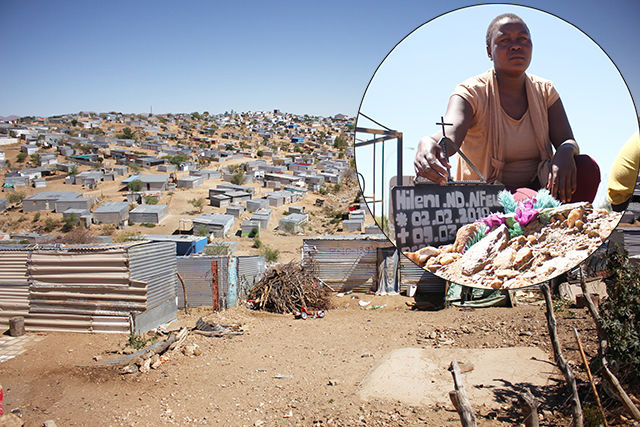By Nomhle Kangootui | 16 November 2018
FOR months it had been a subject of whisper and spoken about in hushed tones. Hepatitis E was other people’s reality, and Alfeaus Sheefeni never thought the deadly virus would touch him or his family.
This was until he looked into his wife’s eyes and asked her “why are your eyes so yellow?”
“Hepatitis E nearly killed my whole family,” Sheefeni told The Namibian last week.
His wife, Johanna Imbondi Sheefeni, was six months pregnant when she was diagnosed with the virus on 1 February at Katutura Intermediate Hospital.
“They immediately induced me into labour and the baby was born on 2 February and put into an incubator. I was kept away from her… the only person who could see her was her father. We were later transferred to Windhoek State Hospital,” she said.
The baby girl, however, died in March.
“It was not a good feeling. I felt I was not a good mother at all,” Imbondi (30) said.
The couple has two surviving children, a three-year-old and a one-year-old.
Sheefeni (35) and his family are among the estimated 9 519 people living in Brendan Simbwaye location in one of Windhoek most impoverished informal settlements, Havana, named after the capital city of Cuba.
As you approach Havana, you are met by thousands of corrugated zinc shacks. The laughter of mostly women and children fill the air; some women are doing each other’s hair, others are doing laundry.
When The Namibian arrived at Sheefeni’s shack, Wilson Phillips’ hit song ‘Release Me’ was playing on a small radio inside.
Imbondi was preparing a meal for the family on an open fireplace outside.
After welcoming the team, Sheefeni recalled how his family’s lives had changed overnight.
“We were so sick that when one was released from the hospital, the other went in,” he recounted. He added that at one point, they thought it was a result of witchcraft.
Life was good until the virus struck down all five members of his family, he said.
“We lost five neighbours. A few houses from ours, an elderly couple died; just down the road, two young women and a child died. These are just people close to my house. But when you walk down the road every day, you hear of a death caused by the virus,” he said.
This scares him. He also feels not enough is being done by authorities to deal with the situation.
“Especially in our area. If you come here most of the kambashus (shacks) are locked, not because people are at work, but because they died of this virus. You don’t see toilets or clean water points here,” he added.
Hepatitis E thrives in filth.
Sheefeni and his wife are unemployed and cannot afford items like soap to wash hands regularly. “But as a mother, I try my best to make sure they drink clean water, and I get those chemicals at the clinic to put in the water for drinking,” Imbondi said.
DEADLY
The government declared hepatitis E a national problem in September last year.
As of last month, there were around 3 835 suspected cases countrywide and at least 508 laboratory cases were confirmed, the health ministry said in a statement yesterday.
The majority – 2 657 – were reported in the Khomas region, followed by Erongo with 861 cases, Omusati with 127 and Oshana with 77.
The ministry said 33 deaths had been reported since 2017 of which 14 (45%) occurred among pregnant women.
Councillor Fanuel Shivute of the Samora Machel constituency – which includes Havana – said three areas in his constituency had been profoundly affected – the Branden Simbwaye, Peter Nanyemba and Kaxumba Kandola locations.
“Things are not getting better,” the councillor said. He warned that serious intervention is needed.
City of Windhoek spokesperson Lydia Amutenya said despite interventions, new cases were still being reported in these areas.
“There is a trend of cases reported fluctuating on a weekly basis (i.e. one case today and the next day they start picking up). Vandalism of municipal infrastructure put in place to respond to the outbreak continues,” she said.
BACK TO HAVANA
On the other side of Kaxumba Kandola location, Sophia Sefanya is at home looking for pieces of leftover candles to light up their home, which is just across from her sister’s shack.
For months there has been no movement from the shack. Her sister Asteria Sefanya died of hepatitis E after falling ill in February. She was a mother of two.
“She visited relatives in the north for about two weeks and when she returned, she was not feeling well. She was vomiting and had stomach pains. She went to the hospital and was diagnosed with hepatitis E, but she died after two weeks,” Sefanya said.
She added that her sister was the one who told them about the virus after hearing about it on the radio.
“So sad, she was the one who told us about the virus, and she died from it. It is very sad about losing someone who was such a hard worker. We came to Windhoek from the north for a better and new life; instead we are living in fear of this hepatitis E,” she said.
“Most of us in this location know it can afflict anyone, anytime. We do not have clean water or toilets in this area,” Sefanya said. Since her sister’s death, they pay more attention to any news about the virus.
Some Havana residents appear to have all but given up hope that someday they will be free from the virus. When they hear that someone had died in the neighbourhood, they ask “Hepati?”, short for hepatitis E.
One such person is Anna Veiyo (29). She said in their area they were trying to do things differently but not everyone is cooperating.
“Most have given up hope, but we have to keep the faith for our children and teach them the right things,” she said.
“We do what we can in our current situation, like washing hands with soap. We make sure the water we drink is clean and boiled, but it is difficult if there are no toilets, clean water, etc,” Veiyo said.
“It is challenging. I have survived the virus, and I don’t want to go back there again.”
BREAKING IT DOWN
A health ministry report states that this year, 39 toilets had been completed and 39 water tanks installed in the Havana and Goreangab areas by the City of Windhoek.
“Water tankers are used to fill the water tanks in the Havana and Goreangab Dam informal settlements, but the City of Windhoek has not adequately maintained this trend. However, the World Health Organisation (WHO) will support the monitoring of the quality of water, in collaboration with the City of Windhoek and the ministry of health,” the report notes.
It adds that there are more challenges regarding the accountability of the health ministry wash team as they are not available to support the City of Windhoek and partners.
The report concludes that the outbreak is protracted and far from being contained with most cases still being detected in areas where water and toilet facilities are limited.
Amutenya added that the Khomas Regional Council had donated four toilets that were installed at Havana four-way stop. Another 16 flush toilets will be handed over to the community soon.
The city had planned erecting 200 additional toilets in the 2018/19 financial year but because of budget limitations will only provide 40 for now.
Besides, 20 toilets were donated by the Chinese government through the Office of the Governor and the Khomas Regional Council. The USA embassy also assisted residents of Havana.
In the meantime, heartache and trepidation about the deadly virus continue to haunt residents of Havana and other areas.
Read more on Hepatitis E at – This article was produced by The Namibian’s investigative unit. Send us story tips via your secure email to investigations@namibian.com.na






